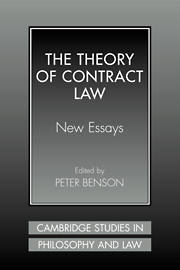Book contents
- Frontmatter
- Contents
- Acknowledgments
- Contributors
- Introduction
- 1 Two Economic Theories of Enforcing Promises
- 2 The Scope and Limits of Legal Paternalism: Altruism and Coercion in Family Financial Arrangements
- 3 Promises and Contracts
- 4 The Unity of Contract Law
- 5 The Theory of Contracts
- 6 Contract Law in the Aristotelian Tradition
- Index
1 - Two Economic Theories of Enforcing Promises
Published online by Cambridge University Press: 05 October 2009
- Frontmatter
- Contents
- Acknowledgments
- Contributors
- Introduction
- 1 Two Economic Theories of Enforcing Promises
- 2 The Scope and Limits of Legal Paternalism: Altruism and Coercion in Family Financial Arrangements
- 3 Promises and Contracts
- 4 The Unity of Contract Law
- 5 The Theory of Contracts
- 6 Contract Law in the Aristotelian Tradition
- Index
Summary
The question, “Why should promises be enforced?” has received many different philosophical answers. One set of answers, of course, comes from the utilitarian tradition. In legal scholarship, these are the answers most often advanced (or presupposed) in the subfield of law and economics.
The purpose of this essay is to distinguish two rather different economic theories (or possible theories) within that tradition. The first theory treats enforcement as equivalent to the eventual performance of the promised actions. On this theory, enforcing the promise is efficient just in case performing the promised actions would be efficient. By contrast, the second theory treats enforcement as altering the parties' incentives, by changing the relevant payoffs from those the parties would face in the absence of an enforceable obligation. Under the second theory, enforcing the promise is efficient just in case the new set of incentives is, on balance, efficient.
Although the second of these theories is the one held by most economists today, the first theory (or some version of it) is sometimes attributed to economists in the noneconomic literature. Accordingly, Sections II and III of this essay set out the two theories and explain the differences between them. The fourth and final section discusses the implications these differences could have for several issues of interest to contract theory: (1) whether to enforce a promise even if circumstances have changed, so that performance would no longer be efficient; (2) whether to presume the efficiency of enforcement simply from the fact that the promise was agreed to voluntarily; (3) whether to enforce a promise if nobody has yet relied on the promise; and (4) whether (or when) to impute a promise to a party who has not promised explicitly.
- Type
- Chapter
- Information
- The Theory of Contract LawNew Essays, pp. 19 - 44Publisher: Cambridge University PressPrint publication year: 2001
- 8
- Cited by

